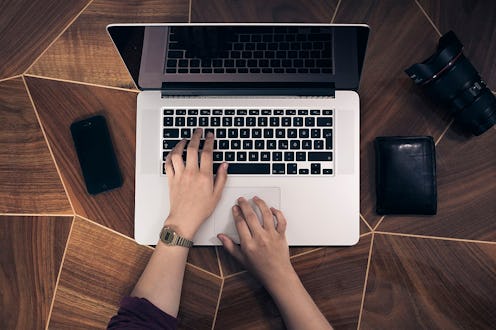Life
Experts Explain Why Checking Your Emails After Work Messes With Your Brain
For many millennials, the 9-5 grind doesn't end at 5 p.m. — or even long after that. The world of work is changing to be more flexible, but that can mean that the boundaries between work hours and time off can become porous. A 2019 survey by Adobe found that 36% of millennials will check their work emails while unwinding at night — but what does that end up doing to your brain?. Experts tell Bustle that while it may be tempting to just dip into your work email and respond to a few requests while watching Netflix, it may actually be damaging to your health. Work-life balance is an important component of wellbeing, and the pressure to answer emails or calls at night can have a negative impact on your psychological and physical state.
Various municipalities have introduced measures designed to make it illegal to expect employees to answer after-hours emails; laws in France, introduced in 2018, mean that bosses can no longer pressure anybody into after-hours communications, and employees need to turn off their work phones and ignore their work emails entirely. The laws reflect a growing concern about how after-hours work can negatively affect workers, and experts tell Bustle that the concerns are justified, on various levels.
After-hours emails can affect your relationships with others, mental health counselor Heidi McBain tells Bustle. "This practice can take away from your connection with the people around you. It can make them feel less important if you are focusing on work on your off hours and not on them, which can adversely effect your relationships." Meaningful relationships are a necessary part of a healthy life; a Harvard study that has been going for 80 years has found that people with strong connections to those around them have better health outcomes and live longer than those who are more isolated. “Taking care of your body is important, but tending to your relationships is a form of self-care too," the lead author of the study, Robert Waldinger, told The Harvard Gazette in 2017.
Even the expectation of being available after work can place strain on these relationships and create adverse health effects, according to a study published in Academy of Management Proceedings in 2018. The study looked at 142 full-time employees and their significant others, and found that people who thought they needed to be on-call all the time — even if they didn't actually have to answer any emails — showed decreases in their wellbeing and their marital happiness over time.
The study found that the practice of being available post-work could cause spikes in anxiety. When anxiety is triggered, the brain shows strong activity in the amygdala, an area related to the processing of emotions and fear, and in the hippocampus, which encodes experiences into memories.
"As soon as [your amygdala] detects something, it releases hormones, adrenaline being the main one, that change your physiology and allow you to flee or avoid the attack," psychotherapist Paola Bailey tells Bustle. This is the root of the 'fight or flight' reaction of the body to stress, and it can have long-term health effects.
The body's hormonal response to stress is meant to gradually relax as the stress passes, but if you don't get a chance to avoid stress — if it follows you home in the form of work emails and passes into your leisure time — you may experience these responses constantly. Over the long term, anxiety can impact short-term memory, cause insomnia, and make you more impulsive — none of which are good for work performance or other daily tasks. The Mayo Clinic notes that long-term stress responses can also cause digestive issues, headaches and stress on the heart.
For many people, McBain tells Bustle, answering emails can be rooted in anxiety born of fear. "This behavior may be fear-based, in that you’d like to set better boundaries around work, but you may fear losing your job if you do so," she says. "This may be something a therapist could help you process, to figure out if this fear is situational and related to problems in your current job."
Fixing a broken work-life balance can be difficult. "Most people who are taking their work home are doing so without the extra pay," Celeste Viciere, a mental health clinician who works with with private therapist practice Uniting Center tells Bustle. "If you are struggling in this area, it is important to work on being intentional about the way you handle work and personal life balance." Depending on your workplace relationships, it may be worth talking to HR or your boss about your stress levels and how your emails outside of work are affecting you.
If you don't have a boss who agrees not to demand work after you go home, you may need to take care of yourself to make sure the stress of after-hour pressure doesn't take its toll. "A daily self-care routine can also be helpful to keep you present in this moment, and hopefully help you prioritize what’s really most important in your life," says McBain. Mental Health America also recommends that people who are struggling to maintain a healthy work-life balance should unplug from electronic devices while at home, remember to exercise, and get help from a therapist if they feel they need professional guidance.
Experts:
Heidi McBain, LMFT, LPC, PMH-C, mental health counsellor
Celeste Viciere, LMHC, mental health clinician
Paola Bailey, PsyD, psychotherapist
Studies referenced:
Becker, W.J., Belkin, L., & Tuskey, S. (2018) Killing me softly: Electronic communications monitoring and employee and spouse well-being. Academy of Management Proceedings 1. https://doi.org/10.5465/AMBPP.2018.121
Martin, E. I., Ressler, K. J., Binder, E., & Nemeroff, C. B. (2009). The neurobiology of anxiety disorders: brain imaging, genetics, and psychoneuroendocrinology. The Psychiatric clinics of North America, 32(3), 549–575. doi:10.1016/j.psc.2009.05.004
Vaillant, G.E., McArthur, C.A., & Bock, A. (2010) Grant Study of Adult Development, 1938-2000. Harvard Dataverse, V4. https://doi.org/10.7910/DVN/48WRX9.
